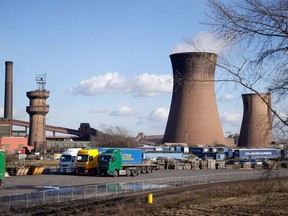
Article content
(Bloomberg) — Energy costs will be cut for as many as 7,000 UK businesses as the government scraps green levies to level the playing field with foreign rivals and boost growth under its new ten-year Industrial Strategy.
THIS CONTENT IS RESERVED FOR SUBSCRIBERS ONLY
Subscribe now to read the latest news in your city and across Canada.
- Exclusive articles from Barbara Shecter, Joe O'Connor, Gabriel Friedman, and others.
- Daily content from Financial Times, the world's leading global business publication.
- Unlimited online access to read articles from Financial Post, National Post and 15 news sites across Canada with one account.
- National Post ePaper, an electronic replica of the print edition to view on any device, share and comment on.
- Daily puzzles, including the New York Times Crossword.
SUBSCRIBE TO UNLOCK MORE ARTICLES
Subscribe now to read the latest news in your city and across Canada.
- Exclusive articles from Barbara Shecter, Joe O'Connor, Gabriel Friedman and others.
- Daily content from Financial Times, the world's leading global business publication.
- Unlimited online access to read articles from Financial Post, National Post and 15 news sites across Canada with one account.
- National Post ePaper, an electronic replica of the print edition to view on any device, share and comment on.
- Daily puzzles, including the New York Times Crossword.
REGISTER / SIGN IN TO UNLOCK MORE ARTICLES
Create an account or sign in to continue with your reading experience.
- Access articles from across Canada with one account.
- Share your thoughts and join the conversation in the comments.
- Enjoy additional articles per month.
- Get email updates from your favourite authors.
THIS ARTICLE IS FREE TO READ REGISTER TO UNLOCK.
Create an account or sign in to continue with your reading experience.
- Access articles from across Canada with one account
- Share your thoughts and join the conversation in the comments
- Enjoy additional articles per month
- Get email updates from your favourite authors
Sign In or Create an Account
or
Article content
Big users of electricity like aerospace, automotive and chemicals firms will be exempted from several climate schemes from 2027 to reduce their bills by as much as 25% and protect 300,000 skilled jobs, the government said.
Article content
Article content
Article content
Separately, heavy industries like steel, chemicals and glass will have their network charges, paid to maintain the grid, discounted by 90% from next year – up from 60% currently. This will help around 500 firms, according to a statement.
Article content
By signing up you consent to receive the above newsletter from Postmedia Network Inc.
Article content
UK manufacturers have long complained about the crippling cost of energy in the UK, which is among the highest in the developed world. Some of that is down to climate levies like feed-in tariffs and the renewables obligation.
Article content
The energy exemptions are the highlight of the government’s Industrial Strategy, a 10-year plan to lift investment and make it easier to do business in the UK. The full plan is released on Monday.
Article content
Prime Minister Keir Starmer said the strategy “marks a turning point for Britain’s economy and a clear break from the short-termism and sticking plasters of the past.”
Article content
The government has been struggling to drive economic growth since hitting businesses with a £26 billion ($35 billion) tax on jobs and higher minimum wage, both of which came into effect in April. GDP that month shrank 0.3% and the Bank of England has warned of underlying weakness in the economy.
Article content
Article content
Labour insisted the exemptions would complement its “long-term mission for clean power” and would not be paid for by raising household bills or taxes. Instead, they will be “funded through reforms to the energy system,” specifically higher UK carbon pricing. As part of the recent trade deal with the European Union, the government agreed to rejoin the EU carbon market.
Article content
A recent study by the Institute of Energy Economics and Financial Analysis found that the government would have raised an extra £2.9 billion over 2024-25 and 2025-26 had it matched the EU’s emissions trading scheme.
Article content
Energy Secretary Ed Miliband blamed Britain’s “reliance on gas sold on volatile international markets” for high electricity costs. He said “doubling down” on wind and nuclear power would “bring down bills for households and businesses for good.”
Article content
In response, the opposition Conservative Party pointed out that energy bills have risen under Labour. “It is astonishing that Labour are finally admitting that the costs of Net Zero are so high that they’re having to spend billions of pounds of taxpayers’ money subsidising businesses’ energy bills to stop them going bust,” said Andrew Bowie, acting shadow energy secretary.

.jpg) 5 hours ago
1
5 hours ago
1
 English (US)
English (US)